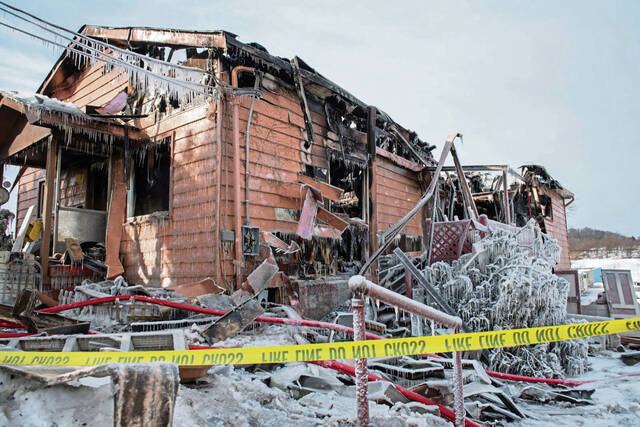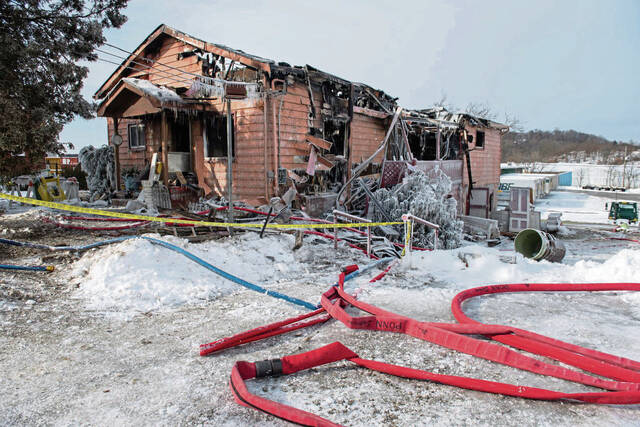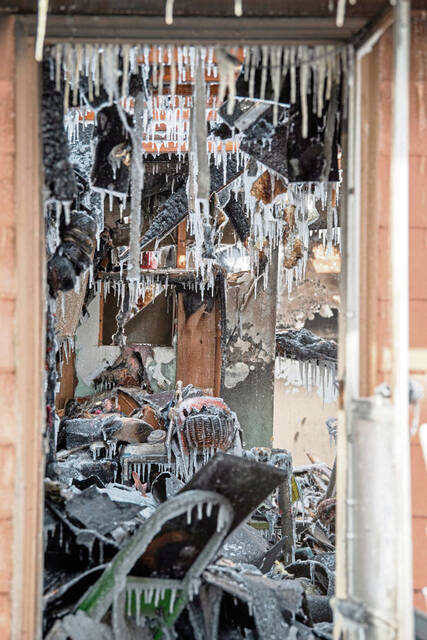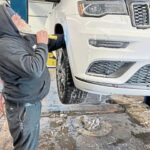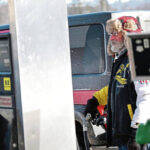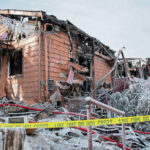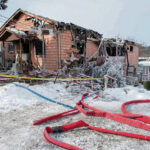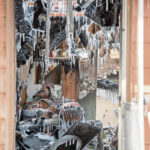The region’s bout with frigid temperatures is not to be taken lightly, area doctors say.
While Western Pennsylvania is familiar with the cold, it’s been some time since low temperatures dipped below zero, and that makes the cold more dangerous than usual.
The last time it was this cold was in early January 2022, when lows reached minus 7 degrees.
The region’s lowest temperature was on Jan. 19, 1994, when it was minus 22, according to National Weather Service data.
What it means, experts say, is that dangerously low temperatures might be something that’s fading from some people’s memory.
Keeping safe is all about limiting the time spent outside.
“The colder it gets, the shorter amount of time it takes to develop hypothermia,” says Dr. Mike Turturro, chief of emergency services at UPMC Mercy hospital. “When you throw wind on top of it, you want to be out there less than 10 minutes or so.”
Experts warn frigid temperatures post the biggest risk to babies and the elderly. Diabetes, circulatory issues and medications that alter the body’s ability to regulate heat can compound the risk.
So can substance abuse and mental illness, leading people to spend unsafe amounts of time outdoors. Some of the patients seen by Dr. Brent Rau, medical director of emergency services at AHN Allegheny General Hospital, have passed out from intoxication in subzero temperatures.
“We have seen some cold-related cases today,” he said Tuesday.
Early symptoms of frostbite include tingling and numbness in the affected areas. More advanced cases involve blisters, skin color changes — even tissue death.
The first stages of hypothermia manifest, in part, as excessive shivering and fatigue but can quickly progress to potentially fatal neurological and cardiovascular issues.
“One reason that hypothermia can be so dangerous is that you might not recognize it as it’s happening,” Turturro said.
As for frostbite, “you want to get that tissue rewarmed using warm water — not hot,” he said. “It’s going to take a good 30 minutes to get it back.”
Aside from physical safety, the cold also brings a host of inconveniences.
Closed due to weather
Dozens of school districts in the region used flexible learning days, operated on delays or were just closed Tuesday because of the subzero morning temperatures — with the same expected Wednesday and even Thursday.
In the Chartiers Valley School District, some primary and intermediate school students were left waiting for buses delayed by up to 45 minutes Tuesday because of issues with batteries freezing, district spokeswoman Angela Conigliaro said.
The district is among those that already have announced the cancellation of classes Wednesday.
Superintendent Daniel Castagna apologized for any troubles the delays might have caused families. He said the district will improve the process to make sure messaging to families is timely, consistent and reliable moving forward.
“Our transportation director is working on a plan to make sure this doesn’t happen again on delay days when it’s extremely cold,” Conigliaro said.
Allegheny County’s court system was closed Tuesday and will be Wednesday because of the cold. The closure also affects all district justices’ offices in the county.
Protect the plumbing
As temperatures continue to plummet to about minus 15 Wednesday morning, people are encouraged to safeguard their home’s plumbing to prevent frozen or burst pipes.
Anthony Fergelec, president of Comfy Kozy Heating Cooling Plumbing in North Versailles, said his crews are ready for the barrage of calls, some of which will require same-day excavation for broken lines.
“When the temperature drops below 20 degrees for more than two days and the heat is off, the likelihood of waterlines freezing increases significantly,” Fergelec said.
“Pipes may break when water starts freezing in two different locations simultaneously, causing pressure to rise well above 10 times the burst pressure of the pipes.”
Faucets should be left on to drip, especially in homes with recurring problems, he said. Pipes that run along exterior walls are especially susceptible.
Vehicles need attention too
One of the most important elements of keeping one’s vehicle operating during a bitter cold snap is to make sure its battery is in good health, said Mike Jamison, owner of Jamison Trucking & Auto Repair on West Pittsburgh Street in Greensburg. Service centers can check the charge in batteries. If it’s low, replace it.
As for the fuel in your vehicle’s tank, keep it filled three-quarters or more, Jamison said. That minimizes the presence of water vapor that can lead to frozen fuel lines.
With snow-covered roads, there needs to be a good amount of tread on tires, Jamison said. Motorists have gotten away from buying snow tires, he noted.
“Make sure you have good windshield washer fluid — down to 20 degrees below zero,” Jamison said. Even then, it does not guarantee it won’t freeze, he noted.
Keep pets safe
The best place for the family pet during bitter cold is inside, said Jen Johnson, manager of All Pets Hospital in Greensburg.
“If it’s too cold for you to be out there, it’s too cold for them to be outside,” Johnson said.
Veterinarian Dr. Harvey Bendix, owner of Norwin Veterinary Hospital, said pets can get hypothermia and frostbite.
“The tips of the tails are extremely vulnerable in the cold,” Bendix said, as well as noses, eyelashes and paws.
The temperatures endured by the pets can cause systemic health problems as well, including cardiac problems, poor blood circulation and impaired body functions.
“If you see an animal left outdoors without proper shelter, meaning they are not able to contain their own body heat within (the enclosure), then call 911,” Johnson said.
By law, dogs cannot be tied outside for more than 30 minutes when it is colder than 32 degrees. During extreme weather, even 30 minutes might be too long,” said Chris Jirak O’Donnell, an Armstrong County humane police officer.
In Vandergrift, Champion Crusaders Rescue is in need of adequate outdoor shelters for cats, according to a Facebook post on the organization’s website.
A spokesperson for Champion Crusaders could not be reached for comment Monday.
Tips for staying warm
“If your home becomes too cold, go to a public library, shopping mall or warming center,” said American Red Cross spokeswoman Nicole Roschella.
Roschella offered several tips to keep people warm and safe:
• Space heaters and fireplaces should sit at least 3 feet from anything that could catch fire.
• Battery-powered flashlights should be used instead of candles.
• Be mindful of the dangers of carbon monoxide. Don’t use an oven for heat.
• Anyone who has to go outside should wear layers of clothing, along with a coat, hat, gloves and water-resistant boots. Cover your face with a scarf.





